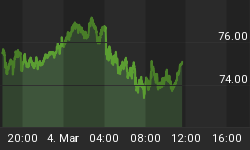All these housing bailout schemes got your head spinning? All these central bank swap-o-ramas with financial institutions got you perplexed? Are you trying to understand it all?
Well, imagine for a moment that there is a budding craze developing around toilet paper. Yes, plain old-fashioned TP is about to become the next "big thing" in the investment universe. Now some folks might just continue to consume what they need, while others will begin to horde TP like crazy. Soon the backyards of North America may be filling up with rented shipping containers to provide the storage space for that most valuable of all commodities - TP. Still others, the smart set, will make a play on TP future contracts, and options on TP manufacturers.
What will be the consequence of all this activity? Well the price of TP will skyrocket and the hoarder/speculators will become rich. And yes the more levered they are, the more of a modern day Croesus they will have become - everything they touched seemed to have turned into TP. These high TP prices will have created an affordability issue and there will be a growing call for the establishment of a Federal Toilet Paper Administration (the FTPA) to provide more liquidity (eau de toilette?) to the TP marketplace.
However, this may all seem a bit irrational to some of you because nowhere was there a real increase in demand for TP, or curtailment of supply. Some of you may think this all a bubble which will have to, sooner or later, be flushed away. The hoarder/speculators will be stuck with a bunch of TP that isn't worth, well, more than toilet paper. They're in distress. What to do? Should the FTPA be given an expanded mandate to help relieve the distress, or should this job just be offloaded to Fannie Mae? (sorry 'bout that).
Two potential solutions will present themselves in this coming scenario/crisis. The one "solution" is to tax, one way or another, overtly or stealthily, the non-hoarders in order to rescue the backyard TP stuffed container people - to accommodate "stability". Why? And what good will that do? What happens when a mania on Kleenex tissue develops - and what is going to stop that from developing? There will be potential profits to be made then, and the same arguments for mitigating losses will be served up then as well.
On the other hand, the TP hoarders that can't pay their debts could simply have their assets seized and liquidated. What would the outcome be? Well, the price of TP will come down and TP will become plentiful and affordable again. Is that so bad?
Well, that's a bit simplistic because one is forgetting about the devastating effect this would cause the speculators. Can you imagine the Wall Street crowd having to power lunch at Micky D's instead of the '21' (.....oh the humanity!). And what of all the TP hedge funds and the banks who provided the leverage. Are you forgetting that our banking system is a fractional reserve one and it is likely that their losses will exceed their capital?
It seems to me that we are living in a derivative world. If one focuses just on the physical toilet paper, the problem isn't really all that complex. The problem arises due to the increasing financialization of our economy. Everything from physical commodities, to the paper security instruments of the stocks of productive companies, to the intangibles, such as interest rates and credit risks become nothing than more than "play activity" in this derivative world of ours. Of course, that will be countered with the efficient markets counter argument. That all this capital shifting hither and fro, arbitraging its way into the crevices of inefficiencies and smoothing them out is actually good for the overall economy.
But all of this strikes me as nothing more than a debate between a pragmatic roll-up-your-sleeves world and the world of the chalkboard, nothing more than a philosophical debate over a priori versus a posteriori knowledge.
If all of these efficient markets nostrums are so right on the money, how could the men and women of America in the 1940's, '50's, and 60's, who built up this great land of ours, be so utterly ignorant? And how did such vast ignorance yield such stellar results? And how indeed, could such wonderful theory yield such abysmal results? With apologies to Nassim Nicholas Taleb, perhaps it wasn't a black swan that so recently disturbed our economic pond - I believe it was just a run of the mill American turkey bird.
The physical sciences periodically go through paradigm shifts: the materialistic view of Thales supplanting the Olympian, the mechanical view of Descartes and Newton, the relativistic and quantum mechanical views of Einstein and Heisenberg. All of these shook up man's view of his physical world. Perhaps too, economics can revisit its fundamental assumptions as well.
I would suggest revisiting the Modigliani-Miller theorem and its capital structure irrelevance principle. Although not cause and effect by any means, not long after its acceptance into the corporate finance world, the U.S. was transmuted into a fiat money economy and it seems one was the fulminate of mercury to the other's dynamite.
In 1847 in a Vienna hospital, Ignaz Semmelweiss noticed a dramatically high incidence of death among women who were assisted in child birth by physicians who had come directly from autopsies. He recommended some practical reforms, like washing of hands. It was a practical instinct that animated him since this was before the germ theory of disease. Despite the devastation all around them, his recommendations were viciously attacked by the establishment. Let us learn from history and return to the practical ways of our forebears.
















